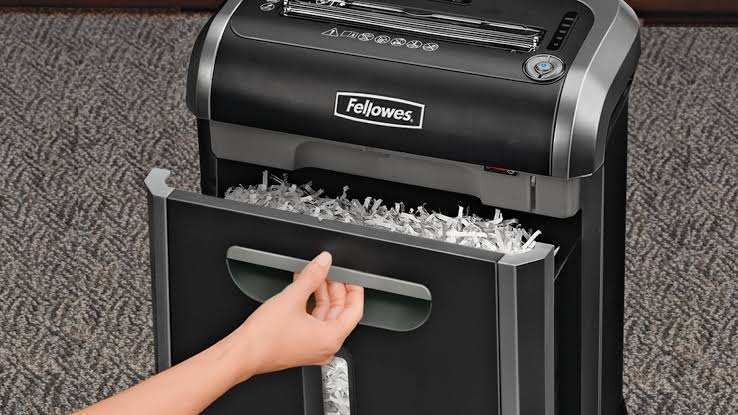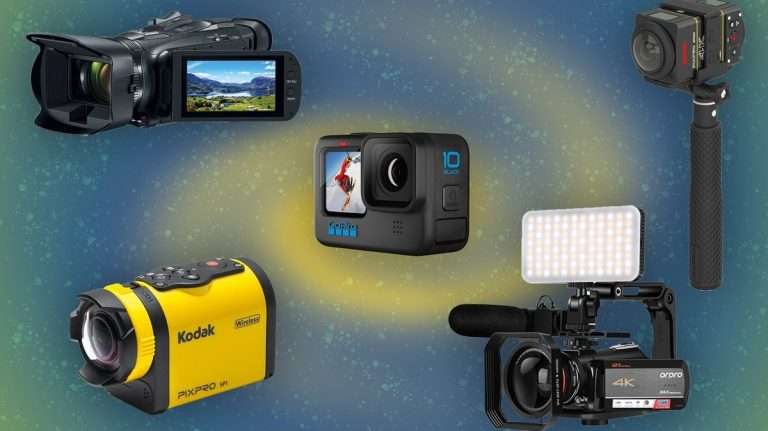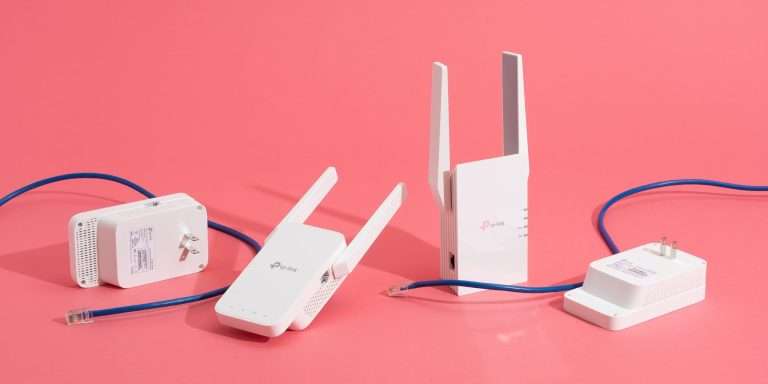Top 10 Best Wireless Routers 2024
Join the numerous customers who have relied on Consumers Voice to help them make smarter purchasing decisions. Our experts will assist you in selecting the best one for your requirements. Find the ideal Wireless Routers for you with the aid of our unbiased professional evaluations and data-driven buying suggestions.
TP-Link AXE5400 Tri-Band WiFi 6E Router (Archer AXE75)
- Up to 5400 mbps wifi for faster browsing, streaming, gaming and downloading, all at the same time.
- The brand new 6 ghz band brings more bandwidth, faster speeds, and near-zero latency; enables more responsive gaming and video chatting.
- True tri-band and ofdma technology increase capacity by 4 times to enable simultaneous transmission to more devices.
- More ram, better processing - armed with a 1.7 ghz quad-core cpu and 512 mb high-speed memory.
- With the feature of VPN Client, it’s easy to configure the VPN on the router and ensure your internet privacy
NETGEAR 4-Stream WiFi 6 Router (R6700AX)
- Fast ax1800 gigabit speed with wifi 6 technology for uninterrupted streaming, hd video gaming, and web conferencing.
- Connects to your existing cable modem and replaces your wifi router.
- Compatible with any internet service provider up to 1gbps including cable, satellite, fiber.
- Plug in computers, game consoles, streaming players, and more with 4 x 1g ethernet ports.
- Sets up in minutes with the nighthawk app easily manage wifi settings, test internet speed, and monitor data usage.
TP-Link Deco AX3000 WiFi 6 Mesh System(Deco X55)
- Next-gen wi-fi 6 ax3000 whole home mesh system to eliminate weak wi-fi for good.
- Covers up to 6500 square feet with seamless high-performance wi-fi 6 and eliminate dead zones and buffering.
- Deco x55(3-pack) is strong enough to connect up to 150 devices with strong and reliable wi-fi.
- Each deco x55 has 3 gigabit ethernet ports(9 in total for a 3-pack) and supports wired ethernet backhaul for better speeds.
- Intelligently learns the network environment to provide ideal wifi unique to your home.
NETGEAR Nighthawk WiFi 6E Router (RAXE300)
- 6ghz wifi band dedicated to wifi 6e devices including samsung galaxy s21 ultra 5g.
- Powerful 1.7ghz quad-core processor gives you exceptional 7.8gbps wifi speed, 6.5x faster than wifi 5.
- Backward compatible for all wifi devices on 2.4ghz and 5ghz bands.
- Compatible with any internet service provider plan up to 1 gigabit including cable, satellite, fiber, dsl and more.
- Easily manage wifi settings at the device and network level, test internet speed and monitor data usage.
TP-Link AX3000 WiFi 6 Router – 802.11ax Wireless Router
- Next-gen gigabit wi-fi 6 speeds: 2402 mbps on 5 ghz and 574 mbps on 2.4 ghz bands ensure smoother streaming.
- 4 high-gain external antennas and beamforming technology combine to extend strong, reliable, wi-fi throughout your home.
- Target wake time helps your devices to communicate efficiently while consuming less power.
- No heat ups, no throttles. A larger heat sink and redefined case design cools the wifi 6 system.
- Control your router via voice commands and make your life smarter and easier with amazon alexa.
NETGEAR Nighthawk 6-Stream AX5400 WiFi 6 Router (RAX50)
- Coverage up to 2,500 sq. Ft. For up to 25 devices.
- Fast ax5400 gigabit speed with wifi 6 technology for uninterrupted streaming, hd video gaming, and web conferencing.
- Connects to your existing cable modem and replaces your wifi router.
- Compatible with any internet service provider up to 1gbps including cable.
- Plug in computers, game consoles, streaming players, and more with 4 x 1g ethernet ports share a storage drive.
TP-Link Tri-Band BE9300 WiFi 7 Router Archer BE550
- With powerful wi-fi 7 performance, lightning-fast wired connections and brand-new design.
- Equipped with one 2.5g wan port and four 2.5g lan ports, archer be550 drives your devices to peak performance.
- Proprietary wi-fi optimization and 6 optimally positioned antennas along with beamforming deliver more capacity.
- Easymesh-compatible: works with easymesh routers and range extenders to form seamless whole home mesh wi-fi.
- Tp-link's premium security service keeps your home network safe with cutting-edge network and iot protection.
ASUS RT-AX3000 Ultra-Fast Dual Band Gigabit Wireless Router
- Future proof your home network with the next-gen WiFi 6 technology, providing up to 2. 7x faster speed
- RT-AX3000 supports 160MHz bandwidth and 1024-QAM, boasting a total network speed of 3000 Mbps.
- AiMesh technology allows you to establish an even stronger mesh WiFi system with other ASUS AiMesh compatible routers.
- AiProtection Pro protects all the connected devices on your home network and advanced parental controls.
- RT-AX3000 WiFi ensures a smooth gaming and 4K streaming experience.
TP-Link Deco AXE5400 Tri-Band WiFi 6E Mesh System(Deco XE75)
- Cover up to 5,500 sq.Ft with next-gen seamless wifi and make dead zones and buffering a thing of the past.
- Experience the latest frequency of wifi, eliminating interference from all legacy devices.
- All three wifi bands work together to unleash your network’s total speeds up to 5,400 mbps for 200 devices.
- Opening the 6 ghz band will change the game for wifi 6. Wifi 6 brings about upgraded performance in network efficiency and capacity.
- Deco xe75 delivers smart wifi that follows you wherever you are, without interruption.
ASUS RT-AX86U Pro (AX5700) Dual Band WiFi 6 Extendable Gaming Router
- New-generation wifi 6 enjoy ultrafast speeds up to 5700 mbps with the latest wifi 6.
- Minimize lag and latency for mobile gaming with just a tap on the asus router app.
- True 2 gbps wired and wireless speeds aggregated 2 gbps wan connections, wired 2.5 gbps port and wifi 6.
- Protect your home network with aiprotection pro, powered by trend micro.
- And when away from home, asus instant guard gives you a one-click sharable secure vpn.
In today’s interconnected world, wireless routers play a crucial role in facilitating seamless internet access and connectivity within homes, businesses, and public spaces. These devices serve as the backbone of modern networking, enabling multiple devices to communicate wirelessly and access the vast resources of the internet. Let’s explore the fundamentals, evolution, and significance of wireless routers in shaping our digital landscape.
Understanding Wireless Routers
A wireless router is a networking device that performs the functions of a router (connecting networks) and a wireless access point (providing wireless connectivity). It acts as a gateway, allowing devices such as laptops, smartphones, tablets, and smart home gadgets to connect to a local area network (LAN) and access the internet via a broadband connection.
Evolution of Wireless Technology
Wireless routers have evolved significantly since their inception. Early models supported basic wireless standards like 802.11b/g, offering limited speeds and coverage. Over time, advancements in technology have introduced faster standards such as 802.11n, 802.11ac, and the latest 802.11ax (Wi-Fi 6), which provide higher throughput, improved range, and better handling of multiple devices simultaneously.
Components and Features
Modern wireless routers typically include several key components and features:
- Dual-Band or Tri-Band: Many routers now operate on dual-band (2.4GHz and 5GHz) or tri-band frequencies, allowing devices to connect to different bands based on their needs for speed or range.
- MU-MIMO (Multi-User, Multiple Input, Multiple Output): This technology enables routers to communicate with multiple devices simultaneously, improving overall network efficiency and performance.
- Beamforming: By focusing wireless signals towards connected devices, beamforming enhances signal strength and reliability, especially at longer distances.
- Security Features: Routers often include built-in firewalls, encryption protocols (WPA3 for enhanced security), and guest network capabilities to protect networks from unauthorized access.
Applications and Use Cases
Wireless routers are integral to various applications and scenarios:
- Home Networking: They enable families to connect multiple devices for streaming, gaming, video conferencing, and smart home automation.
- Business Environments: Routers support robust networks with features like VLAN (Virtual LAN) configurations, VPN (Virtual Private Network) support, and quality of service (QoS) settings for prioritizing traffic.
- Public Wi-Fi: In cafes, airports, and other public spaces, routers provide internet access to users, often with captive portals for authentication.
Challenges and Future Trends
Despite their advancements, wireless routers face challenges such as interference from other devices and security vulnerabilities. Future trends include the integration of AI (Artificial Intelligence) for network optimization, expansion of IoT (Internet of Things) capabilities, and the deployment of 5G for faster wireless broadband access.
Conclusion
Wireless routers have revolutionized how we connect and interact in the digital age, empowering individuals and organizations with fast, reliable internet access. As technology continues to evolve, the role of wireless routers in shaping connectivity and fostering innovation will remain pivotal. Whether at home, work, or on the move, these devices are instrumental in creating a seamless and interconnected world.

















